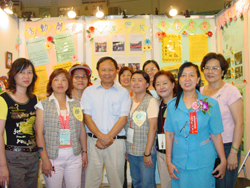Holding Hands and Accompanying Me - Exhibition of Foreign Spouses' Achievements in Lifelong Learning

A Warm Feast to Commend Foreign Spouses and Exhibit the Cultures of New Immigrants
Directed by MOE and the Council for Cultural Affairs, the Holding Hands and Accompanying Me - Exhibition of Foreign Spouses' Achievements in Lifelong Learning event sponsored by the Changhua County Government and the Cultural and Educational Foundation of Sugarcoated Haws on a Stick was held from 11 a .m. to 4 p.m. at Changhua County Gymnasium on Sunday, June 25, 2006.
Minister Tu noted that the event had three objectives. The first objective was to consolidate and exhibit the fruitful results of foreign spouses' lifelong learning and family education that has been actively promoted by MOE and county/city governments in recent years. These were promoted so the public could gain an understanding of the efforts the government has made and to provide various counties/cities with an opportunity to learn from each other. The second objective was to commend foreign spouses who have made outstanding performances and contributions to their family, the society and personal learning for their efforts, and encourage them to actively participate in social service. The third objective was to allow the public to gain further knowledge of the customs, education, culture and religious beliefs in the countries of these foreign spouses. At the same time, foreign spouses had the opportunity to better understand Taiwan – the country they live in – so that cultural exchange could be enhanced.


The event exhibited the fruitful results of educating foreign spouses and developing the cultures of new immigrants carried out by MOE and 25 counties/cities across the nation. The event consisted of four areas: an art and culture showcase, interactive teaching, exchange services and stage performances. The art and culture showcase area comprised a Southeast Asia Culture Hall and an Exhibition of Foreign Spouses' Achievements in Lifelong Learning. The former introduced the basic national conditions and cultures of Vietnam , Indonesia , Thailand , the Philippines and Kampuchea and exhibited their period pieces. In addition, virtual zones of the five nations were designed for participants to have a taste of what these countries are like. The latter exhibited the results of providing foreign spouses with education by the education bureaus of 25 counties/cities and family education centers across the nation.


The interactive teaching area featured educational games that gave souvenirs to winners, Southeast Asian toys that were very popular with parents and children and free teaching on the making of handicrafts. The exchange service zone provided information on cultural visits to and sightseeing in the Asia Pacific region, Southeast Asia living fair and gourmet dining. The stage programs zone featured top-grade Southeast Asian folk music, dancing and Changhua local community art building performances. The most important part was the awarding of the 2006 Foreign Spouses Lifelong Learning Prizes. The 46 winners wore official costumes of their native countries to attend the prize-awarding ceremony.


2006 Foreign Spouses Lifelong Learning Prizes were awarded for the first time in Taiwan . The prizes fell into two categories: Best Learning Achievements Prizes and Family of Outstanding Foreign Spouse Prizes. The prizes were awarded to commend foreign spouses who have made outstanding performances and contributions to their families, learning and society. Twenty-four contestants made it to the semifinals in the Best Learning Achievements Prizes category, which in the end had 18 winners, while 22 made it to the semifinals in the Family of Outstanding Foreign Spouse Prizes category, with 21 winning final awards .From the contestant information provided by counties/cities, whether they were winners or semifinalists, it was obvious that all participants were fearless of hardship and very diligent in terms of learning. In addition, they were all strongly supported and recognized by their Taiwanese families.


Through this warm cultural feast, Taiwan nationals had the opportunity to better understand Southeast Asian cultures. Families of foreign spouses were able to exchange experiences, get together and spend a happy Sunday together.